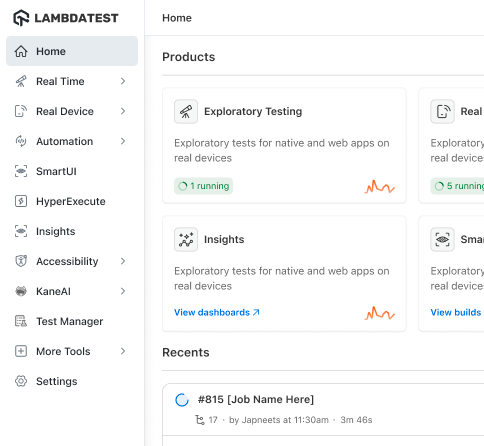Next-Gen App & Browser
Testing Cloud
Trusted by 2 Mn+ QAs & Devs to accelerate their release cycles

UUID Decoder
This free online tool allows you to decode and analyze UUIDs in seconds, helping you uncover hidden details like version, structure, and embedded timestamps with zero hassle.
Enter UUID to Decode
UUIDs are in the format: 00000000-0000-0000-0000-000000000000
Output
What is a UUID?
A UUID (Universally Unique Identifier) is a 128-bit number used to uniquely identify information in computer systems. They're commonly used in databases, distributed systems, and APIs. UUIDs can come in different versions (v1, v3, v4, v5), each with its own method of generation.
Example UUID: f47ac10b-58cc-4372-a567-0e02b2c3d479
How to Use the UUID Decoder?
Follow these easy steps to decode your UUID:
- Enter UUID: Paste your UUID into the input box at the top.
- Click "Decode UUID": Hit the black Decode UUID button to process the input
- View the Results: The decoded UUID information will appear instantly in the Output section below.
- Clear the Input: Want to try another UUID? Just click the Clear button to reset everything.
Common Use Cases for UUID Decoder
- Debugging & Troubleshooting: Developers use UUID decoders to inspect how a UUID was generated, helping debug systems that rely on UUID v1 by extracting embedded timestamps or MAC addresses.
- Timestamp Extraction (UUID v1): Decode UUID v1 to retrieve the embedded timestamp, useful for logging, tracing, or analyzing event timelines.
- Learning & Educational Use: Ideal for understanding the structure of different UUID versions, especially for students, developers, and testers learning UUID mechanics.
- Verifying UUID Format: Validate UUIDs by checking their format, version, and variant bits for compliance with standards like RFC 4122.
- Reverse Engineering or Forensics: Security researchers decode UUIDs to trace data origins or uncover system-level details (e.g., MAC addresses) during investigations.
- Parsing UUIDs in APIs or Databases: Extract insights from UUIDs in APIs, logs, or databases, particularly in distributed systems where UUIDs act as unique identifiers.
UUID Version (“M”) Conversion Table
| UUID Format | Explanation |
|---|---|
| 1-7 (4 bits) | Indicates the UUID version. For example: |
| Version 1: Time-based UUID | Based on timestamp and machine identifier. |
| Version 2: DCE Security UUID | Includes POSIX UID/GID and time. |
| Version 3: Name-based UUID (MD5) | Generated from a name using MD5 hash. |
| Version 4: Random UUID | Randomly generated (most common version used). |
| Version 5: Name-based UUID (SHA-1) | Generated from a name using SHA-1 hash. |
| Version 6: Reordered Time-based UUID | A variation of version 1, with the time component reordered for easier sorting. |
| Version 7: Time-based UUID with Unix Epoch | Based on timestamp and including microsecond precision, intended for more precise sorting in time-based systems. |
UUID Variant ("N") Conversion Table
| UUID Format | Explanation |
|---|---|
| 8-11 (2 bits in the first byte) | Indicates the UUID variant (typically, the most common variant is "RFC 4122"). |
| Variant 0: Reserved for NCS backward compatibility | Rarely used. |
| Variant 1: RFC 4122 | The most common variant for UUIDs. This is the default format used by most libraries and systems. |
| Variant 2: DCE Security UUID | Used for UUIDs that include POSIX UID/GID. |
| Variant 3: Reserved | Rarely used. |
Frequently Asked Questions (FAQs)
What is a UUID?
A UUID (Universally Unique Identifier) is a 128-bit number used to uniquely identify data in computer systems. It’s commonly used in databases, APIs, and distributed systems.
What versions of UUIDs can this UUID checker decode?
This tool supports decoding of:
- UUID v1 (time-based)
- UUID v3 (name-based, MD5)
- UUID v4 (random)
- UUID v5 (name-based, SHA-1)
- UUID v6 (reordered time-based)
- UUID v7 (Unix timestamp-based)
While v4 is random and contains no embedded metadata, v1 and v6 include timestamps and MAC address information.
UUID v7 is based on Unix time and is optimized for sorting and high-throughput systems.
Can this tool extract the timestamp from UUIDs?
Yes! If your UUID is version 1, the tool can extract and display the embedded timestamp and MAC address used during generation.
Is it safe to use this UUID Converter?
Absolutely. This tool runs entirely in your browser. No UUID data is sent or stored on any server, ensuring full privacy and security.
What happens if I enter an invalid UUID?
If the input is not in a valid UUID format, the tool will alert you with an error.
Why does UUID v4 show no timestamp or MAC address?
UUID v4 is randomly generated and contains no meaningful metadata like time or hardware info. That's why decoding v4 only shows version, variant, and raw bits.
Did you find this page helpful?
More Tools
 Code Tidy
Code Tidy Data Format
Data Format Random Data
Random Data Hash Calculators
Hash Calculators Utils
Utils


